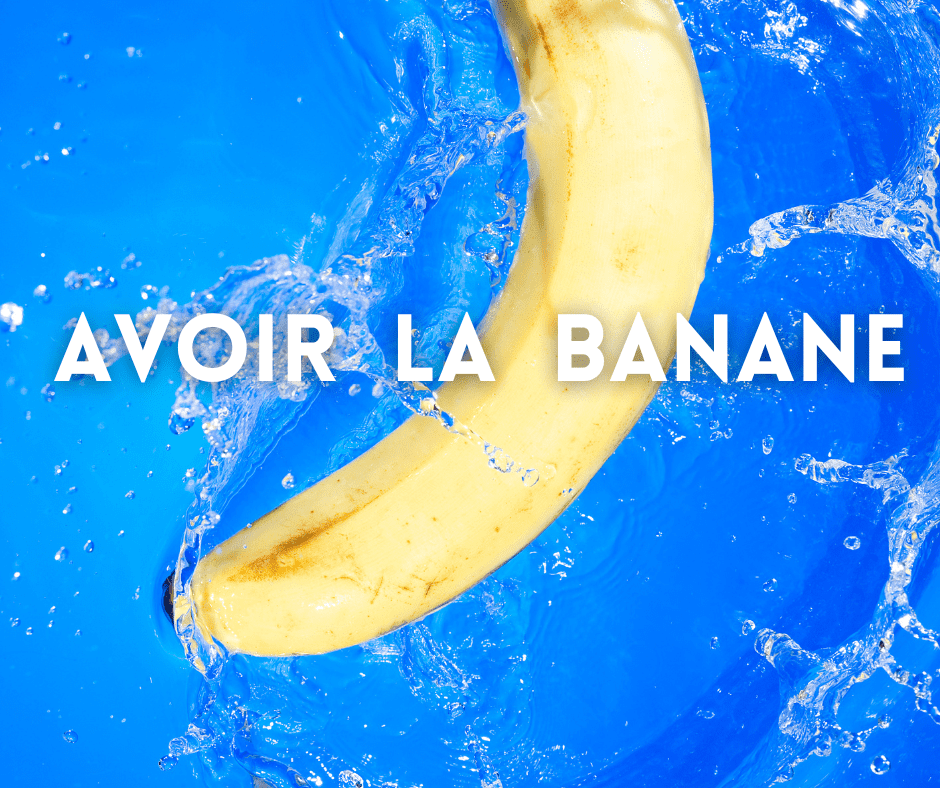
Avoir la banane, la patate, la pêche ou la frite
Literally to “have the banana, to have the peach, to have the potato, the fry [fries])
To be perky, to have it, to be over the hill (Over the hill means OLD)
Those expressions define a person who is energetic, dynamic and has good mental/mood.
La signification
Être en bonne forme, être dynamique, avoir le moral au beau fixe.
L’origine
On pourrait ajouter dans le même sens « avoir la patate » et « avoir la frite ».
Toutes ces expressions se réfèrent au visage si l’on considère que la banane est la forme du sourire, et que la pêche et la pomme de terre évoquent la tête. Mais difficile de comprendre pourquoi.
En fait avoir la banane, la patate, la pêche ou la frite seraient empruntés au vocabulaire des sports de combat. Ainsi avoir la pêche provient de la locution avoir de la pêche, qui se dit d’un boxeur qui a de la force et de la vigueur dans ses coups (pêche = coup de poing). Avoir la frite serait alors employé en référence au dynamisme et au punch du boxeur. L’expression s’est peu à peu étendue à la condition non plus physique mais mentale dans le sens d’avoir un bon moral.
Une autre explication sur l’origine de l’emploi de « pêche » nous vient de la culture chinoise.
D'abord, dans la culture chinoise au IIIe siècle, on considérait ce fruit comme étant source d’immortalité. Le poète chinois Zhang Hua décrit un verger dans lequel une divinité taoïste cueillait tous les 3.000 ans des pêches. Ces fruits avaient un pouvoir inestimable : celui de devenir éternel. La divinité invitait des simples mortels à venir les goûter et ces derniers devenaient à leur tour détenteurs d'un pouvoir qui fait toujours rêver. La pêche, le brugnon, comme la nectarine sont des mutations naturelles de ce qu’on appelait 'la pomme de Perse', un fruit qui est apparu il y a plus de 3.000 ans au nord de la Chine : la boucle est bouclée. Avoir la pêche était donc la garantie d’une santé inoxydable.
ENGLISH
Origin
We can add in the same meaning potato and fries.
All of these expressions refer to the face if one considers that the banana is in the shape of a smile, and that a peach and a potato are shaped like the human head. But it is difficult to understand why.
In fact, to have the banana, potato, peach or fries are borrowed from combat sport vocabulary. Thus to have the peach comes from the phrase avoir de la pêche, which is said of a boxer who has the strength and stamina in his blows (pêche = punch). To have fries would then be used in reference to the dynamic punches of the boxer. The expression is less and less extended to not just the physical condition, but mental condition in the sense of being in a good frame of mind.
Another explanation on the origin of the use of "pêche" comes to us from Chinese culture.
In Chinese culture in the 3rd century, on considered this fruit as being a source of immortality. The Chinese poet, Zhang Hua
described an orchard in which a taoist divinity who harvested peaches for 3,000 years. These fruits had an esteemed power: that of becoming
eternal. The goddess invited simple mortals to come taste the fruits and the last ones became in turn holders of a power to always
dream. Peaches and nectarines are natural mutations of what one called the apple of Perse, a fruit which first appeared more than 3,000
years ago in the north of China. The circle is complete. To have the peach was therefore the guarantee of solid health.
Design by Monsieur Graphic | Powered by Oncord
